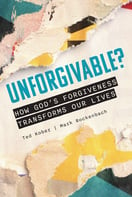Turning from your sins, wrongdoings, and difficulties is hard for even the most devout Christian. Sometimes the sin doesn't feel all that serious, or it just feels good to do it. Other times we fear appearing weak by admitting our failures. Still other times we think we can avoid the consequences of our sins if we don't own up to them. Are you finding it difficult to repent? Read this blog post adapted from Unforgivable? How God’s Forgiveness Transforms Our Lives to see three reasons you might be finding it hard to repent.
1. Because You Cling to Your Sin
God made man and then made woman from man and said, “Therefore a man shall leave his father and his mother and hold fast [cling] to his wife, and they shall become one flesh” (Genesis 2:24). It is God-pleasing for a man to cling to his wife. Throughout Scripture, marriage is a union between a man and a woman that should not be broken. This is God’s command. So, if a married man or woman decides to cling to someone else, they have committed adultery. That one has sinned against God and against his or her spouse.
Anna, a research participant, was married eighteen years to her husband who served in active-duty military. They were living near her family and friends until the military decided to reassign him eight hundred miles across the country to a different base. Anna packed up the house and moved with her children to a new home to be with her husband. She said, “I unpacked it all, had everything ready for when he finally did arrive.” But her husband never spent a night in their new home.
He had met someone else and was having an affair. Her husband stopped holding fast, or clinging, to his wife and decided to break God’s commandment. Of course, he asserted lots of excuses and blamed Anna for many things. But he was unwilling to repent of his sin. He was so invested in his new relationship that, Anna said, “He paid to move us back and get us out of his way.”
When someone refuses to repent, he is choosing to cling to the sin that he has committed. When confronted with his sin, he feels no sorrow or remorse. He has no intent to turn away from the sin. In fact, he plans on indulging in the sin.
The psalmist says, “My soul clings to the dust; give me life according to Your word!” (119:25) Jonah also reflected, “Those who cling to worthless idols turn away from God’s love for them” (2:8 NIV) We either cling to our sinful ways or we cling to God for mercy. Those who cling to their sin die in their sin, but those who cling to God inherit eternal life.
2. Because You Fear Others More than You Fear the Lord
We often think of fear as being terrified or scared of something. People are afraid of spiders, snakes, heights, or germs. Biblically, the word fear can refer to people who are frightened, but it can also be used toward the person or things in which you place your trust. When the angel of the Lord appeared to the shepherds to proclaim the birth of Jesus, the angel assured them, “Fear not, for behold, I bring you good news of great joy that will be for all the people” (Luke 2:10). It would be correct to say that the angel was saying, “Do not be terrified by my appearance and do not trust in yourselves. Trust in the Word of God that I am speaking to you.”
Sometimes we are more concerned with what others think about us than what God’s Word has to say. It may be difficult to repent because we think others will see repentance as weakness or a failure. The Bible calls this idol “fear of man” (Proverbs 29:25). We fear what others think of us more than we fear God. Saul feared that others might view him as a failed king. I feared that others might view me as a failed father.
Sin tends to lead us to fear and trust in our own ability by making excuses and blaming others. We forget about God. We neglect to fear or trust in God, who promises to forgive a repentant person.
If someone doesn’t repent, it may be that she fears and trusts in herself or others more than she fears and trusts in the Lord. And when confronted with her sin, she chooses to trust in her own ability to handle the situation rather than being refreshed by the Lord’s forgiveness (e.g., Acts 3:19). She trusts in her own justification rather than in Jesus’ cleansing blood.
Paul says, “You were bought with a price; do not become bondservants of men” (1 Corinthians 7:23). We either fear and trust in ourselves and others, or we fear and trust in the Lord. Proverbs 29:25 declares, “The fear of man lays a snare, but whoever trusts in the LORD is safe.” Those who fear and trust in themselves and others are trapped in sin that leads to death. But those who fear and trust in God live eternally with Him.
3. Because You Want to Avoid Consequences
Sin brings consequences. After Adam and Eve sinned, they could no longer stay in the Garden of Eden, they would have to work the land, and women would have pain in childbirth (Genesis 3). After Moses struck the rock with his staff, he was not allowed to enter into the earthly Promised Land of Canaan (Numbers 20:1-13).
There are two kinds of consequences that result from sin—earthly consequences and eternal consequences. Adam and Eve and Moses endured earthly consequences for sinning against God. But they did not suffer eternal consequences.
Sin produces both earthly and eternal consequences. Some people avoid admitting sin because they think they can escape the consequences of their actions. They fear the earthly consequences but often forget the eternal consequences. For example, someone who broke a contract, stole money from an employer to pay for credit card debt, or hit another car while backing out of a parking space might attempt to cover up the transgression to avoid suffering the consequences. To avoid earthly consequences, they hide the sin by lying, blaming others, manipulating, and a plethora of other means. They forget that clinging to unrepentance bears eternal consequences.
If they don’t repent, it may be that they are more terrified of earthly consequences than eternal consequences. When confronted with their sin, they strive to avoid the earthly consequences, unaware of the eternal consequences.
Repenting means acknowledging that you have sinned and you need the forgiveness of Christ. A repentant person turns away from the transgression and turns toward Christ. God freely grants the gift of forgiveness to all who trust in Jesus Christ for their salvation. Yes, there may be earthly consequences, but those who repent will never endure eternal consequences. Peter says, “Repent and be baptized every one of you in the name of Jesus Christ for the forgiveness of your sins, and you will receive the gift of the Holy Spirit” (Acts 2:38). And “Repent therefore, and turn back, that your sins may be blotted out, that times of refreshing may come from the presence of the Lord” (3:19-20). Adam and Eve and Moses endured earthly consequences for their sinful actions, but in repentance (that is, confession and faith) they turned away from their sin and turned to God.
Those who do not repent die in their sin and suffer eternal consequences. But those who repent do not perish but have eternal life.
Unless marked, Scripture: ESV®.
Copyright © Concordia Publishing House.
 Find forgiveness and healing by learning how to turn away from unforgiveness in Unforgivable? How God’s Forgiveness Transforms Our Lives.
Find forgiveness and healing by learning how to turn away from unforgiveness in Unforgivable? How God’s Forgiveness Transforms Our Lives.













